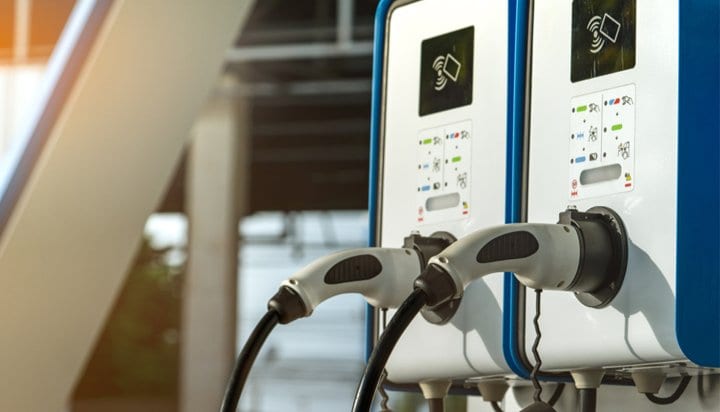Some 6,000 rapid EV chargepoints are to be in place across England’s motorways and major A roads by 2035, part of plans to accelerate early EV adoption and remove range anxiety concerns on long journeys.
The UK government said it regards an extensive public charging infrastructure as key to bringing forward the end of sales of all new petrol, diesel and hybrid cars and vans from 2040 to 2035, or earlier.
To realise this vision, detailed analysis has been undertaken to assess the number of chargepoints required to meet future en-route charging needs.
Currently, a driver is reportedly never more than 25 miles away from a rapid (50kW) chargepoint along highways, with a total of 809 open-access rapid chargepoints, as of 1 January 2020, including an average of two rapid charge points at motorway service areas.

However, the Rapid Charging Fund – announced in the March 2020 Budget as part of a £500m commitment for EV charging infrastructure – aims to ensure there is a rapid-charging network ready to meet long-term consumer demand for EV chargepoints ahead of need.
As such, by 2030, around 2,500 rapid charge points are expected across England’s motorways and major A roads, rising to 6,000 by 2035.
The plans also provide for at least six rapid, open-access charge points (150-350kW capable) at motorway services in England by 2023, with some larger sites having as many as 10-12.
The high-powered chargepoints are said to be able to charge up to three times faster than most chargepoints currently in place, and can reportedly deliver around 120-145 miles of range in 15 minutes.
What’s more, drivers will be able to pay for the cost of charging their vehicle using debit or credit card; information about the chargepoints on motorways will be openly available; chargepoints will be available 99% of the time; drivers will be supported by 24/7 customer care to handle any technical issues; sites will have chargepoints that support all EV types; and there will be clear pricing information available in pence per kilowatt hour.
The government said it has powers under the Automated and Electric Vehicles Act to bring in regulations if necessary, to improve the consumer experience of using EV charging infrastructure and to ensure levels of chargepoint provision at key sites such as motorway service areas.
Want to read more stories like this?
https://www.cittimagazine.co.uk/first-rapid-charging-hub-opens-on-m6/
https://www.cittimagazine.co.uk/ionity-opens-its-first-350kw-ev-charging-station-in-uk/
https://www.cittimagazine.co.uk/gridserve-secures-funding-for-ev-charging-forecourts/
https://www.cittimagazine.co.uk/researchers-make-ev-wireless-charging-breakthrough/





